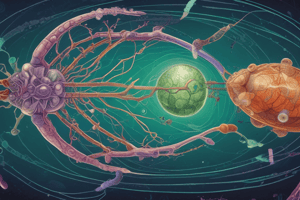Podcast
Questions and Answers
प्राणींच्या संविदानाच्या आढावा का अभ्यास करतो?
प्राणींच्या संविदानाच्या आढावा का अभ्यास करतो?
- जीवांच्या प्रजननाची दर (correct)
- जीवांच्या उत्पादनाची दर
- जीवांच्या संख्यिकी
- जीवांच्यांची मृत्यू
जीवजगातीच्या विकासाचे मूळ सिद्धांत कोणते आहे?
जीवजगातीच्या विकासाचे मूळ सिद्धांत कोणते आहे?
- वंशानुसारी जीवनक्रम (correct)
- मॉलेक्युलर बायोलॉजी
- कोशिकांची संरचना व कार्य
- पर्यावरणशास्त्र
कोशिका बायोलॉजी ही कोणत्या सोयीसकनेची अध्ययन करते?
कोशिका बायोलॉजी ही कोणत्या सोयीसकनेची अध्ययन करते?
- महत्त्वाची क्रियें उत्पन्न करण्याची प्रक्रिया
- कोशिका में केमिकल प्रक्रिया
- कोशिका में आत्मसंरक्षण प्रक्रिया
- कोशिकांची संरचना, कार्य, व परस्परसंवाद (correct)
मॉलेक्युलर बायोलॉजी अध्ययन करते वेगवेगले कार्य कुठले ते समजून सुरू करा.
मॉलेक्युलर बायोलॉजी अध्ययन करते वेगवेगले कार्य कुठले ते समजून सुरू करा.
जीनेटिक्स हा कोणता महत्त्वाचा अध्ययन करते?
जीनेटिक्स हा कोणता महत्त्वाचा अध्ययन करते?
'प्रकृती' म्हणून कोणाची अध्ययन केले जाते?
'प्रकृती' म्हणून कोणाची अध्ययन केले जाते?
'प्रौद्योगिकी' हेच कोणता क्षेत्र?
'प्रौद्योगिकी' हेच कोणता क्षेत्र?
Study Notes
Exploring Science: A Deep Dive into Biology
Science, a broad field of human inquiry, encompasses various disciplines that seek to understand the world around us through observation, experimentation, and theory development. In this article, we'll be focusing on one of the most fascinating and complex areas of science: biology.
What is Biology?
Biology is the science that studies living organisms and their interactions with the environment. It investigates the structure, function, growth, and evolution of living organisms, seeking to uncover the underlying principles that govern life and explain the diverse forms and behaviors observed in nature.
Biology is divided into numerous subdisciplines, including:
- Cell Biology: The study of the structure, function, and interactions of cells, the fundamental units of life.
- Molecular Biology: The study of the chemical processes that underlie biological functions, such as DNA replication and protein synthesis.
- Genetics: The study of heredity, focusing on the transfer of genetic information from one generation to the next and the mechanisms that govern this process.
- Evolutionary Biology: The study of the history of life, the processes that create change and diversity, and the mechanisms that drive evolution.
- Ecology: The study of the interactions between living organisms and their environment, focusing on the distribution, abundance, and interactions of species.
- Population Biology: The study of the dynamics and behavior of populations of living organisms, examining factors such as growth, reproduction, and mortality.
- Physiology: The study of the functions of living organisms, focusing on the mechanisms that maintain life and allow organisms to adapt to their environments.
The History of Biology
Biology as a formal scientific discipline has a rich history that dates back thousands of years, with ancient Greek philosophers like Aristotle making some of the earliest observations and theories about living organisms. However, the modern era of biology began with the work of scientists like Carl Linnaeus, who devised the system of binomial nomenclature for classifying organisms, and Gregor Mendel, who discovered the principles of inheritance known as the laws of segregation and independent assortment.
Modern Advances in Biology
Today, biology has made significant strides in our understanding of living organisms. Advances in techniques such as molecular biology, genomics, and bioinformatics have enabled scientists to study the structure and function of living organisms at the molecular level, revealing new insights into the mechanisms that govern life and disease.
Biotechnology, a field that applies scientific knowledge to develop new products and processes, has revolutionized the biomedical and agricultural industries, leading to the development of innovative treatments for diseases and the creation of genetically modified organisms.
The Importance of Biology
Biology is a fundamental field of study that has applications to nearly every aspect of our lives. It provides the knowledge and tools necessary to combat diseases, develop new drugs, improve agricultural practices, and address environmental challenges. In addition, biology has applications in diverse areas such as forensics, biotechnology, and conservation biology.
As we continue to make new discoveries and push the boundaries of our understanding of living organisms, biology will remain a fascinating and essential field of study, shaping our future and unlocking the secrets of life.
Studying That Suits You
Use AI to generate personalized quizzes and flashcards to suit your learning preferences.
Description
Delve into the diverse field of biology, from the study of cells and genetics to ecology and evolution. Learn about the rich history of biology and modern advancements that have revolutionized our understanding of living organisms. Discover the importance of biology in various fields and its impact on human life.




